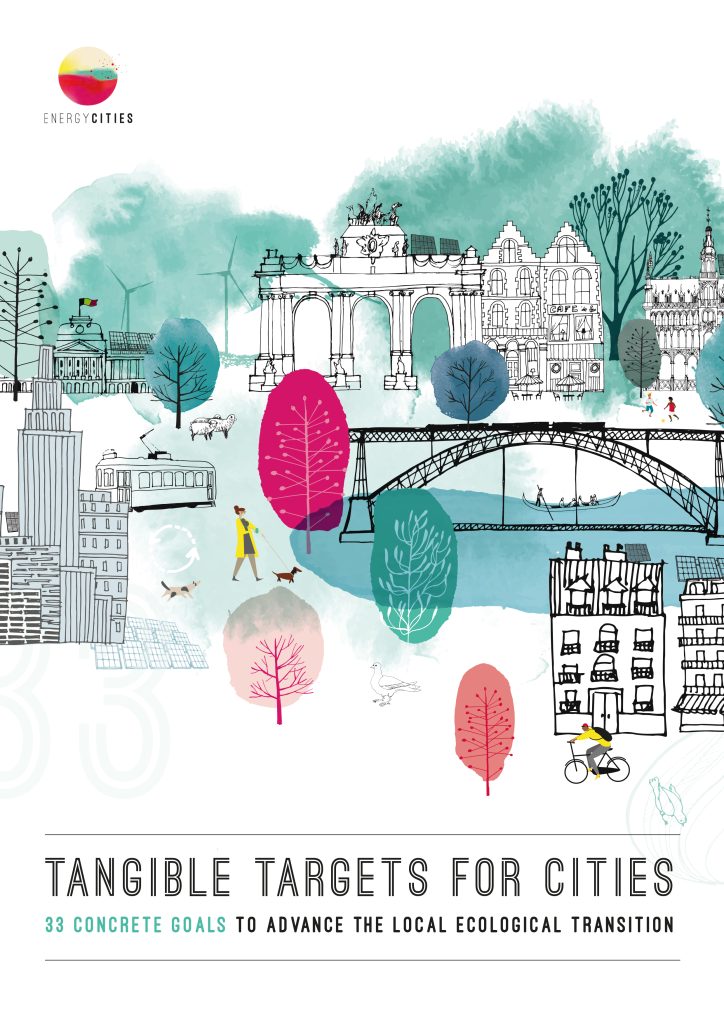One composting opportunity per citizen…
And other tangible targets for more sustainable food systems in your city
If you want to engage everyday people into your city’s transition to a climate-neutral and resilient future, it’s important to set goals that they can relate to. To get everyone involved, you will need to communicate more than CO2 emission reduction goals – difficult to measure for the average citizen – and set concrete targets that anyone can grasp and engage with.
You can’t find much more tangible than the food we buy and eat. People deal with food in their lives daily, multiple times a day. Agriculture is also responsible for around 10% of greenhouse gas emissions in Europe. In setting up more sustainable food policies for your city, it’s important to make them visible to citizens: in the groceries they buy, the waste they dispose of, the food they consume, and the areas that they see dedicated to food production in their surroundings.
Here are a few tangible targets for your city related to food and agriculture, inspired by citizens’ assemblies, local pacts, and other projects across Europe.
Composting Opportunity for each citizen
The Citizen Covenant of eastern Paris set up the target of developing collective composting opportunities for all its inhabitants. To tackle food waste, each municipality should provide a solution for citizens to sort their biodegradable waste (bio-waste), whether it is managed by the municipality itself, an association or by citizens themselves.
Bio-waste is managed very differently from country to country. The city of Vienna stands as a frontrunner of waste management. For more than 50 years, the city has been organizing waste separation, collection and recycling, especially for bio-waste. As part of their “Smart and Climate City” strategy, they act at the source to strengthen their plan targeting a halving of food waste by 2030.
Decrease Meat consumption by 40%
The Climate Assembly of the UK debated on the measure of cutting meat and dairy consumption between 20% and 40%.
Copenhagen and London are among the 14 major cities which committed to cut meat consumption in 2019 with the “Good Food Cities” project. Copenhagen City Hall has voted in favor of reducing the amount of meat served by public services such as kindergartens and hospitals. They voted for a reduction of 25% by 2025. The country is also considering implementing a tax on food deemed harmful to the climate. For instance, beef would be taxed up to 33%.
Double the organic agriculture surface area
The Climate Citizen Covenant of Grenoble adopted a series of measures to support organic agriculture and agro-ecology. All these measures could double organic farming in the territory.
In this line, Ljubljana, capital of Slovenia, is supporting more than 800 farms in the city limit as part of its “City rural development”. Through this plan, the city develops short supply chains, contributes to the preservation of farm land, and provides support and training to farmers and other stakeholders.
Serve at least 75% organic or locally produced food in school cafeterias
In the French city of Nantes, the Citizen Covenant has voted the target of 75% of organic or locally produced food in school cafeterias by 2026.
The Swedish city of Växjö, European Green Leaf winner in 2018, reported that just under half of all food served by the municipality is either organic or locally produced. This city is a great illustration that the path to high-quality food is not only desirable, but also feasible.
More tangible targets for your city…
Are you looking to set ambitious targets for your city’s transition?
Find further inspiration in our Tangible Targets publication, which includes a comprehensive set of 33 targets spanning across food, housing, mobility, energy, biodiversity, circular economy, and awareness raising!
… Inspired by Citizens’ Assemblies
To compile this list, we largely drew inspiration from Citizens’ Assemblies focused on climate issues in various European cities. Many times, the measures debated and suggested in these assemblies are more ambitious than the policies implemented. We hope that the measures emerging from Citizens’ Assemblies inspire bolder and faster action in cities across Europe, putting the citizen at the center of the transformational journey towards a climate neutral and resilient future.

Tangible Targets for Cities: 33 goals to advance the local and ecological transition

